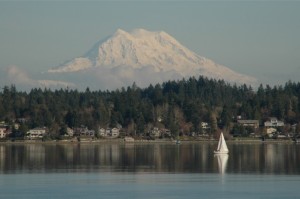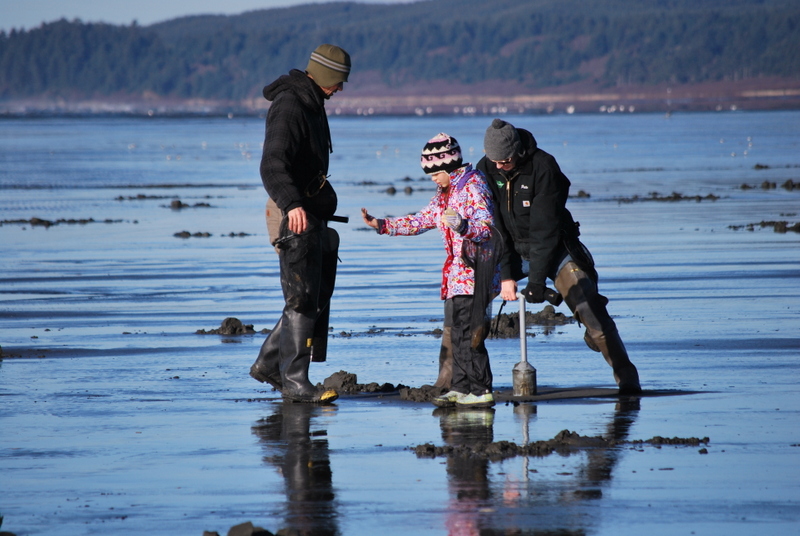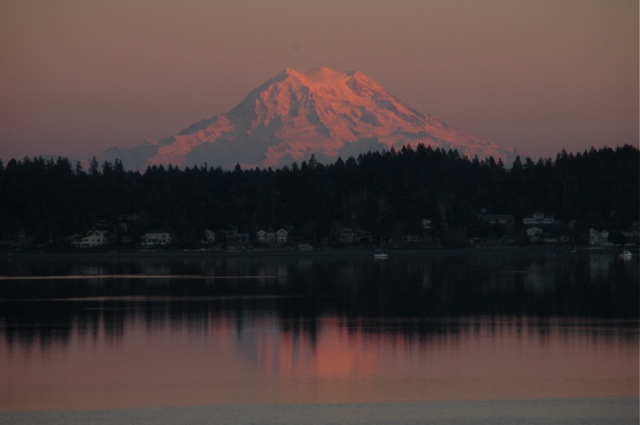Submitted by City of Lacey, City of Olympia, City of Tumwater, Intercity Transit, Thurston County, and Port of Olympia
 Earth Day is upon us but for some, every day is Earth Day. That’s the case for local governments in the South Puget Sound region, whose sustainable practices, earth-friendly programs, and conservation efforts, make a difference and get noticed.
Earth Day is upon us but for some, every day is Earth Day. That’s the case for local governments in the South Puget Sound region, whose sustainable practices, earth-friendly programs, and conservation efforts, make a difference and get noticed.
The cities of Lacey, Olympia, and Tumwater, along with Thurston County, the Port of Olympia and Intercity Transit, have a long history of conservation, recycling, and green energy programs. These organizations developed partnerships, garnered grant funding, and received numerous awards for their environmental efforts.
One example of an innovative earth-friendly program is the long-standing partnership between the cities of Lacey, Olympia, and Tumwater, and Thurston County broadly known as Stream Team. The program helps connect volunteers with activities that protect and enhance local streams and freshwater habitats. Another example is the LOTT Clean Water Alliance created in 2000. The program manages wastewater needs and infrastructure in the urban areas of North Thurston County and helps lessen the impact of treated wastewater on our environment.
Thurston County, the cities of Tumwater, Lacey, and Olympia, and Intercity Transit have all initiated clean energy programs with the help of Puget Sound Energy. The results include a $20,000 grant from PSE that allowed the construction of a solar energy project at the Olympia Timberland Regional Library building, anticipated to save approximately $4,000 per year and reduce greenhouse gas emissions by nearly six metric tons. Thurston County upgraded office lighting, heating and cooling systems, and changed outdoor lighting to LEDs at the County Courthouse complex, resulting in more than $70,000 in annual savings and cutting carbon by over 500 tons per year. Tumwater residents participation in the green power program increased by 80 percent last year, earning a $20,000 grant for a solar demonstration project at Tumwater City Hall, which has since expanded significantly.
Most of the aforementioned organizations have received Green Business designations by the Thurston Chamber of Commerce Green Business Program. These local governmental agencies encourage their employees to reduce drive-alone trips by using transit, ridesharing, biking, and walking instead.
City of Lacey – Lacey’s residents, businesses, and municipal government purchased nearly 23 million kilowatt-hours of green power last year, resulting in a reduction of nearly 16,000 tons of carbon dioxide from the atmosphere – equivalent to not burning 1.6 million gallons of fossil fuels. One hundred percent of the electrical energy used by the city’s municipal buildings, utility systems, park facilities, and 3,000 street lights comes from environmentally sound energy sources. The City of Lacey’s commitment to renewable energy has garnered the EPA’s coveted “Green Power Community” award for the eighth consecutive year – among the longest standing such communities in the country.
The city recently completed a $2.1 million state-of-the-art facility that makes use of reclaimed water to recharge critical aquifers feeding Woodland Creek. Located in Woodland Creek Community Park, the new facility will help stabilize stream flows in the creek, which provides critical habitat for federally-listed Chinook salmon, as well as runs of Coho, Chum, Sockeye, and Winter Steelhead.
Other sustainable efforts include significant investments in public utilities, such as the Chambers Lake Stormwater Facility, which will improve water quality and create wildlife habitat and recreational amenities in the center of the city. Residents and businesses also reduced water consumption by nearly 15.2 million gallons last year, bringing cumulative annual water savings to nearly 39 million gallons.
Lastly, the city earned the Tree City USA designation from the National Arbor Day Foundation for its twenty-third year. More than 6,000 street trees beautify Lacey’s streets, and much of the community’s 1,200-acre parkland and open space network – one of the largest municipal park systems on South Puget Sound – permanently preserves large tracts of native forest. For more City of Lacey information, go to www.ci.lacey.wa.us.
City of Olympia – Last month, Olympia acquired six all-electric vehicles for the City fleet, three of which replaced gas powered ones. The City also installed two electric vehicle (EV) charging stations next to City Hall that are available for both City vehicle and public use. While
too early to measure results, these investments are intended to support EV use within the community, reduce greenhouse gas emissions, and lower City fuel costs. The City also has an employee pass program with Intercity Transit as part of its commute trip reduction efforts.
Residents from seven Olympia neighborhoods are participating in the City’s One-Side Road Collection pilot program which thus far resulted in garbage/recycling trucks using 22 percent less fuel in those areas and the related reduction in greenhouse gas emissions. Customers in the participating neighborhoods now set their carts out on the same side of the road which means trucks no longer travel in both directions.
The Washington State Recycling Association recently recognized Olympia’s Public Works as the Public Agency Recycler of the Year for its accomplishments and new programs centered on a Zero Waste Vision. The Vision to Zero Waste program leads the Olympia community toward a waste-free future and plays a strategic role creating opportunities to eliminate waste. Olympia’s innovative programs include an award-winning GrassCycling Virtual Workshop, Pedestrian Recycling, 3rd Grade Education Program, Business Waste Assessments, and Community Event Recycling/Composting.
Most recently, Olympia received a State Department of Commerce grant award to place solar panels on City Hall, aiding the already significant energy savings of the LEED Silver building opened in 2011. For more City of Olympia information, go to www.olympiawa.gov.
City of Tumwater – The City of Tumwater’s sustainable redesign of the Capitol Boulevard Corridor will improve the pedestrian, bicycle, and transit-friendly nature of the community. This multi-year planning project engaged hundreds of citizens and many businesses resulting in significant public input to redefine and enhance the character, mobility, and future of Tumwater. A similar planning effort is occurring in the Brewery District where the community is visioning a compact and walkable mixed-use area, allowing people to live and work in the same vicinity. The efforts to redevelop the brewery will focus on reuse of the existing facilities and infrastructure to rejuvenate and enliven an urban center.
Other sustainability efforts include water use reduction since 2010 by more than 93,136 gallons a day from conservation efforts by Tumwater customers. The city previously adopted low impact development and light pollution standards, and received a Tree City USA designation for 19 consecutive years in honor of its commitment to effective urban forest management.
This year, the City of Tumwater will invest more than $2 million (including $500,000 from a Department of Commerce energy efficiency grant) to update and replace its HVAC heating and cooling equipment and replace most of its streetlights with LED lights, to provide considerable cost savings and energy efficiency over time. And just recently, Tumwater received an additional $219,000 grant from the Washington State Department of Commerce to install a photo-voltaic solar project at its city hall. For more City of Tumwater information, go to www.ci.tumwater.wa.us.
Intercity Transit – Intercity Transit, the public transportation agency for Thurston County, recently received ISO 14001 certification for its significant environmental and sustainability efforts. It is one of only a few transit systems in the nation to earn this arduous certification, achieving a high international standard of environmental management. The agency’s Environmental and Sustainability Management System work formally began in 2010 when the Federal Transit Administration selected Intercity Transit for a two-year program provided through Virginia Technical Institute.
Recognized as the best public transportation system for its size in the nation in 2009, Intercity Transit was the first transit system in the U.S. to garner a gold-level rating from the American Public Transportation Association for its Sustainability Commitment in 2012, and was designated as a Bike a Friendly Business by the League of American Bicyclists in 2013. Most recently, Intercity Transit received the top green business honor (government category) from the Thurston Chamber of Commerce Green Business Program, recognizing efforts in waste reduction, water conservation, energy efficiency, green purchasing, pollution prevention, and transportation.
Last summer and fall, the organization’s water conservation effort saved over 800,000 gallons of water and over $4,000 by irrigating less at its facilities. The agency is finishing a lighting upgrade that will save 300,000 kilowatt-hours and about $20,000 annually. Intercity
Transit is also a 100% Green Power Partner with PSE, effectively supporting independent wind, landfill gas, and agricultural waste producers in our region.
Later this year, a full one-third of the Intercity Transit bus fleet will operate with hybrid biodiesel-electric vehicles. The agency reported in 2013 performance of its existing hybrid buses translated to the equivalent of saving 62,000 gallons of fuel and $185,000. For more Intercity Transit information, go to www.intercitytransit.com.
Port of Olympia – The Port’s Swantown Marina was distinguished as “5-star Leadership Clean” by Clean Marina Washington in 2013, after first being certified as “Leadership Level Clean” in 2008. Swantown Boatworks was one of the first three recipients of the Clean Boating Foundation’s “Leadership Clean” awards. The sponsoring foundations’ memberships include state environmental agencies, environmental groups and industry representatives.
The Port’s Marine Terminal installed 48 solar panels on its warehouse roof that generated 9.67 kW in the first 12 months, exceeding the Port’s goal and making the warehouse energy neutral. As a result, PSE provides annual cash rebates to the Port.
The Port, the primary sponsor, partnered with City of Olympia, South Puget Sound Salmon Enhancement Group, and the Squaxin Island Tribe in 2013 to restore the Mission Creek Estuary to its full ecological function. Mission Creek flows into Budd Inlet at the south end of Priest Point Park.
The Port’s environmental programs also include: compliance with five quarter quality permits issued by the Washington Dept. of Ecology; Cascade Pole cleanup, treatment and redevelopment; cleanup and revitalization of East Bay properties which included working together with City of Olympia and LOTT to clean up areas for new roads and sidewalks and for the sites of the Hands On Children’s Museum and East Bay Public Plaza.
The Port of Olympia strives to operate and develop facilities in an environmentally responsible and sustainable manner while adhering to our overall mission of providing economic benefits to the citizens of Thurston County. For more Port of Olympia information, go to www.portolympia.com.
Thurston County – The Thurston County WSU Extension offers a Native Plant Salvage program where volunteers salvage small native trees, shrubs, and plants from areas scheduled for clearing due to development. After being cared for, the plants are provided to community groups to restore habitat and improve water quality.
The County’s Master Recycler Composters program gives volunteers the chance to become resident experts and educators on topics like waste reduction, recycling, and composting. Volunteers share waste prevention information with local citizens and participate in a wide range of county waste prevention activities and community events.
Thurston County also has an employee bus pass program, known as TC Rider. The long-standing program with Intercity Transit supports the commute trip reduction interests of Thurston County and the Washington State Department of Transportation.
Lastly, Thurston County’s Public Health and Social Services Department has numerous programs that monitor the health of our food, land, lakes, streams, and marine waters in Thurston County. The Environmental Health Division offers classes and workshops, as well as an “Environmental Health Matters” blog. For more Thurston County information, go to www.co.thurston.wa.us.




















































